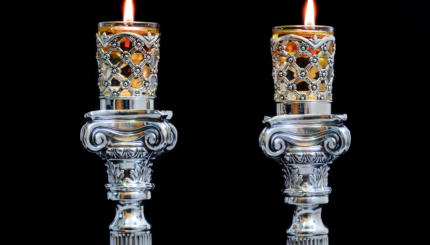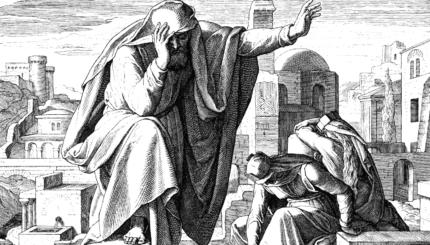“The Day of Atonement is the time of repentance for everyone, for the individual as well as for the multitude; it is the goal of the penitential season, appointed unto Israel for pardon and forgiveness” (Maimonides, Mishnah Torah, Laws of Repentance, Chapter 2, Section 7).
The repentance of the Day of Atonement is the repentance of uplifting and exalting sin. “And in His temple everything saith, Glory” (Psalms 29:9) said the Psalmist. “This is the incense of the day of Atonement” was how our sages homiletically interpreted this verse. And the verse immediately preceding it: “The voice of the Lord maketh the hinds to calve and strippeth the forest bare.”
On the Day of Atonement, the Holy One, blessed be He, demands of man that he strip the forest bare, that he take his life in his hand and enter the jungle of his soul, where the animal that is in man hides out. God does not ask man to cut down the trees or to uproot the entire jungle. The world needs jungles just as it needs unirrigated fields and beds of flowers. Jungles contain much that is vital and essential; in the depths of the wild a healthy aggressiveness prevails–but woe to the forest through which the voice of the Lord does not penetrate, the voice which makes the hinds calve and strips the forests bare.
Our desire is not to destroy the trees and we do not aim to burn down the jungles but to turn them to the voice of God! And after that has been achieved: “And in His temple everything saith, Glory ‑This is the incense of the Day of Atonement.” What is incense? A mixture of galbanum and odoriferous spices. Why is it necessary to adulterate the odoriferous spices with foul smelling galbanum? So as to demonstrate that it is possible to take something evil and mix it with good spices and, as a result, not only does the galbanum not detract from the sweet smell of the incense, but this mixture of good and bad actually enhances and augments its fragrance. On the Day of Atonement, incense is burned in the innermost sanctum of the Temple and on that very day, evil ascends to the Holy of Holies; it is not erased by Him who “overlooks sin” but is sanctified and purified by the elevation of sin.

Help us keep Jewish knowledge accessible to millions of people around the world.
Your donation to My Jewish Learning fuels endless journeys of Jewish discovery. With your help, My Jewish Learning can continue to provide nonstop opportunities for learning, connection and growth.
On the Day of Atonement we are not bidden to tear out pages from the Book of Life or from the history of man. Man is not required to cover‑up and conceal the bad years, the years of sin; rather he has the capacity to sanctify and purify them. Do we not pray to God: “Pardon our iniquities on this Day of Atonement; blot out and remove our transgressions and sins from Thy sight, as it is said: ‘It is I who blot out your transgressions, for My sake; I will remember your sins no more?”‘ We thus begin with a prayer for annihilating evil, for blotting out iniquities and remembering them no more. But further on, a second idea is expressed in this very same prayer, the idea that repentance in which sin is annihilated is not enough: “And it is said: ‘For the virtue of this very day shall acquit you of sin, to cleanse you, before God, be you cleansed'”–that is, uplifting and exalting sin. By means of repentance, one can rise and at the same time raise evil to such heights that it may even, together with the incense, enter into the Holy of Holies.
This, then, was the prayer, the command of the High Priest: “Before God, be you cleansed!” It was as if he had declared; Be not satisfied with “He who overlooks sin.” Cast your eyes upward towards “He who bears sin and iniquity.” It is true that the goal of the sacrificial ritual is to achieve acquittal, to blot out evil and obliterate it. Nevertheless, the goal of the whole service of the Day of Atonement is purification, which is why the High Priest does not say, meekly, “And this is my acquittal” as does the individual in making confession upon his sacrifice. Instead the High Priest demands, loudly and clearly: “0 Grant us acquittal!”
Excerpted from On Repentance in the Thought and Oral Discourses of Rabbi Joseph B. Soloveitchik, edited by Pinhas Peli. Reprinted with permission of the publisher. © 1996 Jason Aronson Inc.
Mishnah
Pronounced: MISH-nuh, Origin: Hebrew, code of Jewish law compiled in the first centuries of the Common Era. Together with the Gemara, it makes up the Talmud.

Help us keep Jewish knowledge accessible to millions of people around the world.
Your donation to My Jewish Learning fuels endless journeys of Jewish discovery. With your help, My Jewish Learning can continue to provide nonstop opportunities for learning, connection and growth.
Torah
Pronunced: TORE-uh, Origin: Hebrew, the Five Books of Moses.

Help us keep Jewish knowledge accessible to millions of people around the world.
Your donation to My Jewish Learning fuels endless journeys of Jewish discovery. With your help, My Jewish Learning can continue to provide nonstop opportunities for learning, connection and growth.


